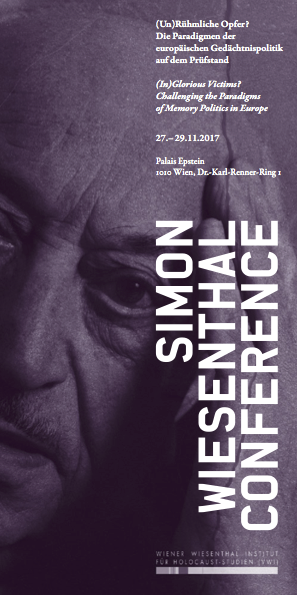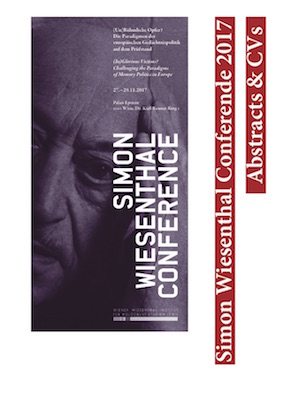Simon Wiesenthal Conferences
As it was still being established, the Vienna Wiesenthal Institute for Holocaust Studies (VWI) already organised two large international conferences: In June 2006, it held the conference “The Legacy of Simon Wiesenthal for Holocaust Studies” at the International Research Centre for Cultural Sciences (IFK) and in June 2007 the conference “Labour and Extermination” at the Wiener Arbeiterkammer (Vienna Chamber of Labour). In October 2011, the Simon Wiesenthal Conference series was continued with the topic “Scores of Commemoration: The Holocaust in Music” at the Vienna University for Music and Performing Arts.
Beginning in 2012, a three-day “Simon Wiesenthal Conference” has been held every year, in English and German. As with the Simon Wiesenthal Lecture series, the conference topics cover the entire range of topics in international Holocaust research, with a new focus each year. The topics are chosen in collaboration with the International Academic Advisory Board. The calls for papers are posted in the usual forums and are primarily aimed at attracting young, ambitious researchers from across the world. Established, internationally renowned scholars are invited to hold key note addresses or concluding and evaluating talks. Thus, the interested public in Vienna are given access to presentations and discussions of the most recent research insights.
The conference proceedings are published each year in a dedicated series of VWI publications, the so-called VWI-Beiträge zur Holocaustforschung, in English or in German.
| Simon Wiesenthal Conference | |||
| SWC 2017: (Un)Rühmliche Opfer? Die Paradigmen der europäischen Gedächtnispolitik auf dem Prüfstand / (In)Glorious Victims? Challenging the Paradigms of Memory Politics in Europe | |||
Monday, 27. November 2017, 09:00 Palais Epstein, Dr.-Karl-Renner-Ring 1 (Eingang Schmerlingplatz), 1010 Wien. Please bring your ID.
|
|||
Im Kontext des Wiederaufbaus Europas gedachte man unmittelbar nach 1945 der Ermordung der europäischen Jüdinnen und Juden fast ausschließlich im Rahmen der großen Erzählung des Widerstands. Dies schuf das Bild antifaschistischen Martyriums, leugnete die Besonderheit des jüdischen Leids und klammerte den Holocaust aus den nationalen Geschichten aus. Mit dem Ende des Kalten Kriegs verlor dieses Narrativ seine Glaubwürdigkeit. Es wurde klar, dass es die traumatische und schreckliche Erfahrung der Schoah nicht wirklich erfassen oder gar zu deren Überwindung beitragen konnte. Die Anerkennung der ‚unpolitischen‘ Opfer wurde nun zum zentralen Inhalt des Diskurses. Im Gefolge dieses Paradigmenwechsels geriet der Holocaust zum allgemein anerkannten und akzeptierten transnationalen europäischen Ereignis und diente nun als Bezugspunkt für eine europäische Identität. Dies produzierte einen hegemonialen, ausschließenden, am Zentrum orientierten – und damit auch äußerst verwundbaren – Diskurs: und das, obwohl der Holocaust, vor allem an den Peripherien, traditionell der Konkurrenz anderer historischer Traumata ausgesetzt war: den Erschütterungen durch die irische Hungersnot, durch den Stalinismus und den Spanischen oder Griechischen Bürgerkrieg. Ziel der Konferenz ist es, die dominanten Narrative über den Holocaust und den Zweiten Weltkrieg, einschließlich ihrer Vorläufer und Folgen, einer kritischen Überprüfung zu unterziehen.
After 1945, within the context of the post-war reconstruction of Europe, memory of the murder of European Jewry was established within the framework of an antifascist resistance narrative, building on the notion of a national (and antifascist) martyrdom, denying the specificity of Jewish suffering and excluding the Holocaust from national histories. With the collapse of the European political blocs, this national antifascist resistance narrative lost its credibility as it became clear that it could not address, let alone overcome the trauma-rooted, terrible experience of the Holocaust. Recognition of victimhood now came to the fore. The Holocaust became the only generally accepted transnational European historical point of reference, serving as a form of symbolic ‘container’ for the construction of a European identity – albeit always challenged by other historical traumas, especially at the peripheries of the continent: the Irish Potato Famine, Stalinism, the Spanish or Greek Civil War. This produced a hegemonic, exclusive and simultaneously very vulnerable centre-oriented discourse of ‘Europeanism’. The aim of our conference is a critical assessment of dominant narratives of the Holocaust and the Second World War, their antecedents, and their consequences.
10:30 Keynote: Daniele Giglioli (Università degli Studi di Bergamo) Diskussion – Discussion 11:30 Mittagspause – Lunch Break 13:30 –15:50 Representations of Victimhood 13:30 Peter Pirker (Universität Wien) 13:55 Fiorenza Loiacono (Università degli Studi di Bari Aldo Moro) 14:20 Kitty Millet (San Francisco State University) 14:45 Oonagh Hayes (Universität Tübingen/GESIS Cologne) 15:10 Diskussion – Discussion 15:50 Kaffeepause – Coffee Break 16:20 – 18:05 Looking in from Outside 16:20 Zoë Roth (Durham University) 16:45 Dirk Rupnow (Universität Innsbruck) 17:10 Diskussion – Discussion Dienstag, 28. November 2017 / Tuesday, 28 November 2017 10:00 – 12:20 Victimhood in Move: Memory Politics in Today’s Poland 10:00 Lidia Zessin-Jurek (Europa-Universität Viadrina, Frankfurt/Oder) 10:25 Joanna Michlic (University College of London) 10:50 Sławomir Kapralski (Uniwersytet Pedagogiczny, Kraków) 11:15 Alicja Podbielska (Wiener Wiesenthal Institut für Holocaust-Studien, VWI) 11:40 Diskussion – Discussion 12:20 Mittagspause – Lunch Break 14:00 – 15:45 From Trials to Museums 14:00 Edith Raim (Universität Augsburg) 14:25 Valentina Pisanty (Università degli Studi di Bergamo) 14:50 Ljiljana Radonić (Österreichische Akademie der Wissenschaften, Wien) 15:15 Diskussion – Discussion 15:45 Kaffeepause – Coffee Break 16:15 – 18:00 Rethinking Master Narratives 16:15 Marie Dominique Asselin (Ottawa) 16:40 Amy King (University of Bristol) 17:05 Anna Wylegała (Polska Akademia Nauk, Warszawa) 17:30 Diskussion – Discussion Mittwoch, 29. November 2017 / Wednesday, 29 November 2017 10:00 – 12:20 Memory Politics in Trouble 10:00 Gábor Egry (Politikatörténeti Intézet, Budapest) 10:25 Georgi Verbeeck (Universiteit Maastricht) 10:50 Thomas Lutz (Stiftung Topographie des Terrors, Berlin) 11:15 Alexandru Muraru (Universitatea „Alexandru Ioan Cuza“ din Iaşi) 11:40 Diskussion – Discussion 12:20 Ende des Vormittagsprogramms – End of Morning Session 14:00 – 15:45 Invisible Victims 14:00 Kateryna Budz (Kyiv) 14:25 Angela Boone (Independent Researcher, Driebergen) 14:50 Evgenia Ivanova / Velcho Krustev (Stara Zagora) 15:15 Diskussion – Discussion 15:45 Kaffeepause – Coffee Break 16:15–18:00 Articulating Suffering in the European Peripheries 16:15 Mykola Borovyk (Ludwig-Maximilian-Universität München) 16:40 Anastasia Felcher (Sankt Petersburg) 17:05 Marta Simó (Universitat Autònoma de Barcelona) 17:30 Diskussion – Discussion 18:00 Konferenzende – End of Conference |
|||








